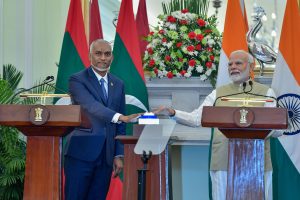In the world of small island nations, political slogans can make great waves — but they can also drown in the undercurrent of economic necessity and regional power plays.
This is the dilemma that confronts Maldivian President Mohamed Muizzu. Having campaigned on an “India Out” narrative, Muizzu has been compelled by the economic crisis at home to put out the welcome mat for his neighbor. Recently, he was in New Delhi shaking hands with Indian leaders and striking deals that contradict his earlier rhetoric.
During his visit, India and Maldives agreed to transform their relationship into a Comprehensive Economic and Maritime Security Partnership, with a people-centric and future-oriented approach. As part of this newly strengthened relationship, India has provided emergency financial assistance to help Maldives address its pressing economic challenges by issuing $100 million in treasury bills, alongside extending it a $400 million and 30 billion Indian rupees bilateral currency swap agreement.
Muizzu’s visit to New Delhi is an opportunity to explore the paradox at the heart of his presidency, especially since he is engaging with the very same country he once sought to distance Maldives from. This raises a fascinating question about the nature of populism in small countries like Maldives. The political messaging that resonated with the voters in 2023 and helped Muizzu win Maldives’ presidency is now clashing with the economic and security realities of the island nation.
Populism vs. Pragmatism
During his presidential campaign, Muizzu capitalized on the nationalist sentiments of the Maldivian people by calling for an end to what he called an undue Indian influence on the country. The “India Out” campaign became a star performer for his party and struck a chord with the masses.
But now, as president, Muizzu is feeling the pressure of governing a country whose economic and geopolitical security is deeply intertwined with its neighbor to the north. The Maldives has always relied on Indian investments in tourism, infrastructure and development aid. While an anti-India posture might’ve helped him ascend to the throne, it cannot help him continue. Muizzu cannot afford to antagonize India without risking a major economic fallout.
This shift from a populist campaign to pragmatic governance is a recurring theme in global politics, and not just in the smaller nations. In 2020, Joe Biden, during his campaign for the U.S. presidency, took a tough stance on Saudi Arabia and pledged to end U.S. arms sales to the Middle Eastern country. Once in office, he realized that cutting off the biggest U.S. weapons purchaser in the world would upset U.S. defense companies, who would now be deprived of their largest cash cow. And so, just a few months after being in office, the Biden administration decided to adopt a more measured approach, clarifying that they only intended to block “offensive weapons,” not “defensive” ones. The realities of geopolitics and economics often force leaders to pivot once they’re in power and Muizzu is no exception.
What’s at Stake?
Small states often struggle to assert their agency in the face of competing regional powers, but Muizzu’s Maldives could become an exception. His state visit to New Delhi is not just about India — it is also about China and it is also about securing a sustainable stability for the island nation. Maldives has been a key player in the broader strategic tussle between India and China in the Indian Ocean region. It grew closer to China under former President Abdulla Yameen. Under Yameen, Maldives took on significant loans for infrastructure projects as part of Beijing’s Belt and Road Initiative. These projects, while beneficial in the short term, have left Maldives with a growing debt burden. As Yameen’s ally, Muizzu also inherited this relationship with China.
On the other hand, India has provided more sustainable forms of aid and investment, making it a more reliable partner in the long run. If Muizzu treads carefully, it might just be able to become a “swing state,” rather than a passive pawn in the India-China dynamics. If successful, this could place Maldives in a unique position of influence.
This state visit has a lot at stake for Maldives. For them, it is not just about economic growth but also about ensuring sustained stability in an increasingly volatile region.
Maldives sits at the heart of the Indian Ocean region. While the anti-India rhetoric may have played well domestically, he cannot ignore the strategic necessity of maintaining strong ties with New Delhi. This visit is an opportunity for Muizzu to demonstrate that he can manage this balancing act effectively

































